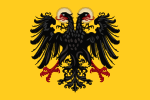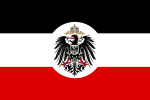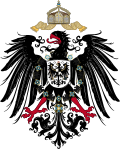The German Empire (German: Deutsches Reich), also referred to as Imperial Germany, the Second Reich or simply Germany, was the period of the German Reich...
151 KB (16,152 words) - 06:19, 28 October 2024
The Holy Roman Empire, also known as the Holy Roman Empire of the German Nation after 1512, was a polity in Central and Western Europe, usually headed...
183 KB (21,116 words) - 10:47, 31 October 2024
The German colonial empire (German: Deutsches Kolonialreich) constituted the overseas colonies, dependencies, and territories of the German Empire. Unified...
149 KB (17,661 words) - 04:52, 29 October 2024
South German states and constitutional adoption of the name "German Empire"), 4 May 1871 (entry into force of the permanent Constitution of the German Empire)...
128 KB (15,530 words) - 13:08, 21 October 2024
The German Empire (German: Deutsches Reich) was a proto-state which attempted, but ultimately failed, to unify the German states within the German Confederation...
16 KB (1,630 words) - 17:42, 23 October 2024
the North German Confederation which was formed in 1867. During the Franco-Prussian War, the German Empire was founded (i.e., the South German states joined...
12 KB (1,111 words) - 06:31, 21 October 2024
defeat of the German Empire in World War I (1914–1918). In the Federal Republic of Germany, the term Deutsches Heer refers to the German Army, the land...
39 KB (4,289 words) - 00:43, 21 October 2024
The German Empire consisted of 25 constituent states and an imperial territory, the largest of which was Prussia. These states, or Staaten (or Bundesstaaten...
4 KB (356 words) - 05:56, 24 May 2024
The Reichstag (German: [ˈʁaɪçstaːk] ) of the German Empire was Germany's lower House of Parliament from 1871 to 1918. Within the governmental structure...
34 KB (3,853 words) - 20:27, 20 August 2024
significantly extending the federal German lands to the newly created German Empire. The Day of the founding of the German Empire, January 18, became a day of...
15 KB (1,715 words) - 00:49, 21 September 2024
German Empire usually refers to the unified German monarchy existing from 1871 to 1918. German Empire may also refer to: Holy Roman Empire, the central...
776 bytes (135 words) - 10:10, 19 February 2024
Germany in 1950. The current official design is due to Karl-Tobias Schwab [de] (1887–1967) and was originally introduced in 1928. The German Empire of...
29 KB (3,223 words) - 08:40, 26 October 2024
The Bundesrat (German for 'Federal Council') was the highest legislative body in the German Empire (1871–1918). Its members were appointed by the governments...
16 KB (1,847 words) - 16:41, 16 June 2024
The military ranks of the German Empire were the ranks used by the military of the German Empire. It inherited the various traditions and military ranks...
20 KB (1,338 words) - 10:14, 1 September 2024
The Constitution of the German Empire (German: Verfassung des Deutschen Reiches) was the basic law of the German Empire of 1871–1918, from 16 April 1871...
18 KB (1,972 words) - 17:48, 23 October 2024
has a long history, stemming back to the Holy Roman Empire (c. 900-1806), when the office of German arch chancellor was usually held by the Roman Catholic...
56 KB (5,216 words) - 01:50, 31 October 2024
the North German Confederation Treaty establishing the Prussia-led North German Confederation later transformed in 1871 into the German Empire. After World...
201 KB (16,377 words) - 12:46, 31 October 2024
in 1806 until the collapse of the German Empire in 1918: The title "King of the Romans", used in the Holy Roman Empire, was, from the coronation of Henry...
36 KB (930 words) - 17:55, 25 October 2024
the German Empire in 1871, the Confederation evolved into a German nation-state and its leader became known as the chancellor of Germany. Originally...
47 KB (994 words) - 12:15, 27 October 2024
size formed by the Imperial German Army during World War I. It was considered by the Allies to be one of the best in the German Army. After experiencing...
11 KB (1,300 words) - 11:33, 6 November 2023
vice-chancellor of Germany, officially the deputy to the federal chancellor (German: Stellvertreter des Bundeskanzlers), is the second highest ranking German cabinet...
33 KB (1,073 words) - 06:05, 31 October 2024
called "German Emperor" when the historical context is clear, as derived from the Holy Roman Empire's official name of "Holy Roman Empire of the German Nation"...
17 KB (1,505 words) - 09:49, 21 October 2024
Nazi Germany, officially known as the German Reich and later the Greater German Reich, was the German state between 1933 and 1945, when Adolf Hitler and...
174 KB (20,513 words) - 05:08, 27 October 2024
and gold (German: Schwarz-Rot-Gold). The flag was first sighted in 1848 in the German Confederation. The flag was also used by the German Empire from 1848...
80 KB (7,790 words) - 13:01, 22 October 2024
existing German Confederation (an association of German states under the leadership of the Austrian Empire), thus paving the way for the Lesser German version...
32 KB (3,411 words) - 00:24, 22 October 2024
Germany from 962. It includes the Holy Roman Empire, Confederation of the Rhine, the German Confederation, the North German Confederation, the German...
119 KB (895 words) - 17:40, 23 October 2024
German Reich (lit. 'German Empire, German Realm' from German: Deutsches Reich, pronounced [ˌdɔʏtʃəs ˈʁaɪç] ) was the constitutional name for the German...
29 KB (3,817 words) - 06:04, 21 October 2024
its non-German lands) and other German states under the Kingdom of Germany were parts of the Holy Roman Empire which was officially a German polity from...
21 KB (2,578 words) - 07:29, 27 October 2024
speakers of the German language. The constitution of Germany, implemented in 1949 following the end of World War II, defines a German as a German citizen. During...
44 KB (4,808 words) - 15:46, 30 October 2024
Emperor of the Holy Roman Empire, the medieval German state. During the High Middle Ages, the Hanseatic League, dominated by German port cities, established...
356 KB (41,757 words) - 02:17, 21 October 2024



















